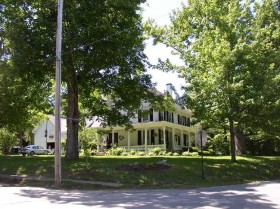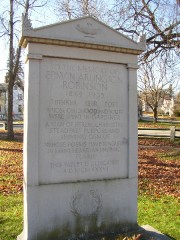Avon’s Harvest (1921)
Captain Craig: A Book Of Poems (1903)
Cavender’s House (1929)
The Children of the Night: a Book of Poems (1897)
Dionysus In Doubt : A Book Of Poems (1925)
The First Seven Years (1930)
Fortunatus (1928)
The Glory Of The Nightingales (1930)
I Make No Measure Of The Words They Say (1896)
King Jasper (1935)
Lancelot (1920)
The Man Against The Sky: A Book Of Poems (1916)
The Man Who Died Twice (1924)
Matthias At The Door (1931)
Merlin (1917)
Modred: A Fragment (1929)
Nicodemus : A Book Of Poems (1932)
The Peterborough Idea (1916?)
The Porcupine: A Drama In Three Acts (1915)
Roman Bartholow (1923)
Sonnets, 1889-1927 (1928)
Talifer (1933)
The Three Taverns : A Book Of Poems (1920)
The Torrent; And The Night Before (1896)
The Town Down The River: A Book Of Poems (1910)
Tristram (1927)
Van Zorn: A Comedy In Three Acts (1914)
(1869-1935) was a poet whose home town was Gardiner. He called himself at one point “a failure from the beginning.” Its no wonder, perhaps, that Edwin Arlington Robinson peopled his poetry with tragic failures.
His home town, where his family moved shortly after his birth on December 22, 1869 in Head Tide, provided his model for “Tilbury Town,” in which his famous characters, among them Richard Cory (based on a Gardiner attorney who died a destitute drunk) and Mr. Flood, let their self-isolated lives. Many of his poems are short character studies that convey in a single incident or a dramatic monologue the essence of a life.
Robinson was a mediocre student at both Gardiner High School and Harvard University, which he left before graduating when his family finances collapsed. Both his mother and his father soon died. Robinson spent the next several years in a hand to mouth existence in New York, working as a timekeeper on a subway construction crew, struggling to write at night.
His first volume of poetry, Children of the Night, earned him little recognition. But Theodore Roosevelt, then governor of New York, read the book and responded enthusiastically. He encourage Robinson and offered him a job as a customs clerk, which allowed Robinson more time in which to write. He kept the job until he was able to support himself as a writer.
By the 1920s Robinson had become a pre-eminent American poet. He won three Pulitzer Prizes, the first in 1922, and an honorary degree from Bowdoin College. His 1922 “House on the Hill” is a villanelle, a French derived poetic form with 19 lines and two repeating lines. He remained until his death. on April 06, 1935, a retiring person who avoided personal publicity.
Author Laura E. Richards, a generation his senior and also a Gardiner resident, mentored Robinson, whose letters to her are among her “Yellow House Papers,” now owned by the Gardiner Library Association. According to the Kennebec Historical Society’s May-June 2003 Newsletter, she supported him “during the dark years of struggle and isolation that Robinson experienced before he established his national reputation in literary circles. By nature, Robinson was withdrawn and morose, but when he writes to Mrs. Richards he comes alive, almost in a bubbly way.”
The City of Gardiner’s affection for Robinson is recorded in the memorial erected in his memory one year after his death.
Additional resources
Anderson, Wallace Ludwig. Edwin Arlington Robinson: A Critical Introduction. Cambridge, Mass. Harvard University Press. 1968.
Coxe, Louis Osborne. Edwin Arlington Robinson. Minneapolis. University of Minnesota Press. 1962.
Fischer, Jeff, et al., Eds. Maine Speaks: An Anthology of Maine Literature. Maine Writers and Publishers Alliance. Brunswick, Maine. 1989.
Hagedorn, Hermann. Edwin Arlington Robinson: a Biography. New York. Macmillan. 1939.
Library of Congress. Edwin Arlington Robinson: A Reappraisal. Washington. 1963.
Neff, Emery Edward. Edwin Arlington Robinson. London. Methuen. 1948.
Redman, Ben Ray. Edwin Arlington Robinson. New York. R. M. McBride & Company. 1926.
Richards, Laura Elizabeth Howe. E. A. R. New York. Russell & Russell. 1936.
Robinson, Edwin Arlington. Untriangulated Stars: Letters of Edwin Arlington Robinson to Harry de Forest Smith, 1890-1905. Westport, Conn. Greenwood Press. 1947.
Romig, Edna Davis. “Tilbury Town and Camelot.” University of Colorado Studies, v.19, no.3, June, 1932. [Photocopy. Augusta, Me. Maine State Library. 1992.]
Van Doren, Mark. Edwin Arlington Robinson. New York. Literary Guild of America. 1927
Winters, Yvor. Edwin Arlington Robinson. Norfolk, Conn. New Directions Books.1946.



